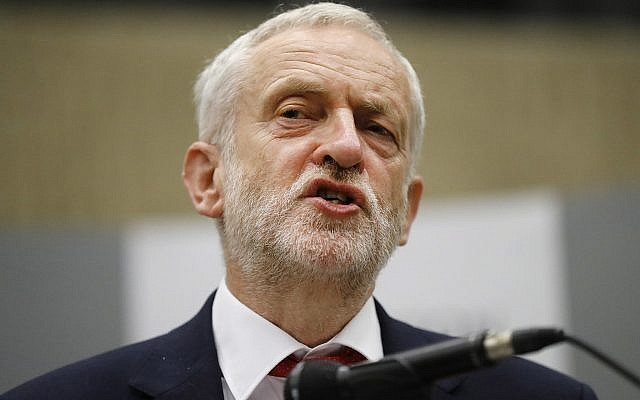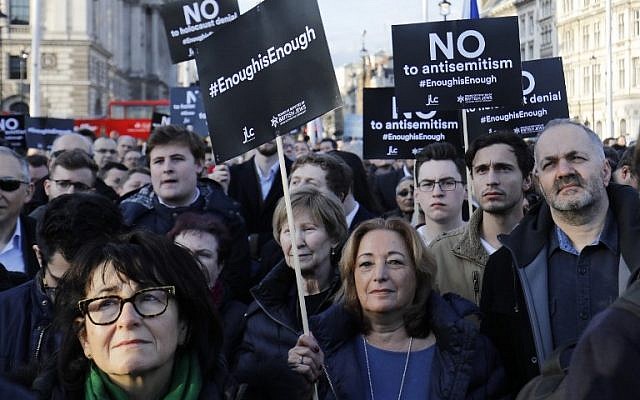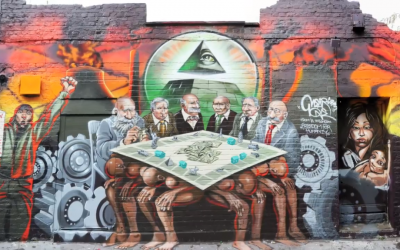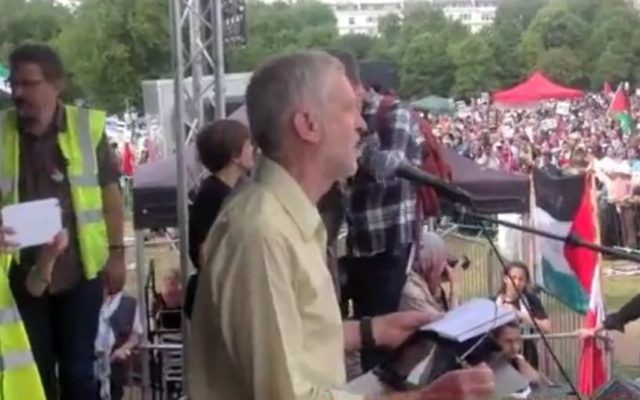In interview over allegations he has spurred anti-Semitism in Labour, UK opposition leader says wants to visit Middle East, ‘ensure there is a process that brings about peace’

Jeremy Corbyn plans to visit Israel and meet with Prime Minister Benjamin Netanyahu “at some point,” the embattled UK Labor party leader said Thursday as part of a wide ranging interview responding to allegations that he has allowed anti-Semitism to spread in his party.
Speaking with UK’s Jewish News following a rally organized by Jewish leaders against anti-Semitism within Labour, Corbyn was faced with questions about his own links to known anti-Semites, past comments on Israel and associations with vehemently anti-Israel figures.
“I’m not an anti-Semite in any way, never have been, never will be. I’ve opposed racism in any form all my life. It’s the way I was brought up, it’s the way I’ve lived my life,” the opposition leader said.
During Monday’s event, around 1,500 protesters massed outside the British parliament. It was an unprecedented rally organized by the usually publicity-averse Anglo-Jewish leadership, and attendees bore signs reading “No to anti-Semitism,” as pressure ramped up on the party and its leader.

The protest was triggered by a Facebook comment from 2012 that recently came to light.
Corbyn had offered support to a street artist whose mural in east London depicted a group of businessmen and bankers, some of them Jewish, counting money around a Monopoly-style board balanced on the backs of men with dark complexions. The mural has since been taken down. On Sunday, Corbyn said he was wrong to support the painter’s “artistic freedom” without looking more closely at the image.
An open letter from the Board of Deputies of British Jews, Anglo-Jewry’s main representative organization, and the Jewish Leadership Council accused the veteran leftist of siding with anti-Semites “again and again.” The letter said Corbyn was “repeatedly found alongside people with blatantly anti-Semitic views,” but “claims never to hear or read them.”
Corbyn told the Jewish News that he recognizes “the hurt that’s felt within the community” and that large numbers at the rally made him “determined” to continue the efforts he said he has initiated to tackle the problem,

Allegations of Labour anti-Semitism have grown since Corbyn, a pro-Palestinian socialist, was elected leader of Britain’s main opposition party in 2015. Some in the party say Corbyn, a longtime critic of Israeli actions against the Palestinians, has allowed abuse to go unchecked.
“Let me say this very bluntly: anti-Semitism is a cancer in our society and it has resurfaced across Europe and in Britain in recent years. It has to be challenged at every single stage,” he said.
But while vehemently rejecting the suggestion that he has personally allowed anti-Semitism to flourish within his party, Corbyn repeatedly tempered his conciliatory comments towards the Jewish community by stressing his support for the Palestinians and a two-state solution.
“I’m zero-tolerant of racism. I want to see, as I’ve repeated, a peace process in the Middle East. I want to see a society free of the scourge of racism and our party conference last year passed a very strict and very clear rule on this,” he said when asked to explain how how “an anti-racist has repeatedly come to be associated, to repeatedly lend support to people with anti-Semitic views while still saying you have this zero tolerance approach.”
Fleshing out his vision for what he called “a just solution for the whole region,” Corbyn said that Israel’s “settlement policy should end, the occupation of the West Bank should end, to have an effective two-state solution.”
The Labour leader was challenged to explain past controversies over his stance on Israel which have included referring to Iranian-backed Islamist groups Hamas and Hezbollah as “friends,” and, during a speech in 2009, as patron of the Palestine Solidarity Campaign, inviting members of the two terror groups to speak at the British Parliament.
“I’ve made my position clear. That is, I do not support what their aims are,” he said of Hamas and Hezbollah. But, he continued, “I do believe you have to engage in political discourse with people that you fundamentally disagree with. Any society that wants to embark on a peace process has to engage with people they disagree with.”

Corbyn said that “you have to recognize the rights of all people in order to bring about peace,” adding that he didn’t believe that amounted to anti-Israel sentiment given that “there are many people in Israel who would recognize that there also has to be justice for the Palestinian people.”
Asked if he planned to visit Israel, the opposition head said: “At some point, yes, I will be in the Middle East.”
“Would you be happy to meet Netanyahu?” Jewish News reporter Justin Cohen pressed.
“Well I will be visiting the state of Israel so yes, of course,” Corbyn said somewhat hesitantly.
The Labour leader insisted, however, that in any such meeting, he would make his position clear of the need for Israel to recognize Palestine.
“What I want to do is ensure there is a process that brings about peace in the Middle East. A Labour government would be fully engaged in bringing that about – that involves recognition of the state of Palestine, an end to the settlement policy and occupation and a two-state future,” Corbyn concluded.
As reported by The Times of Israel
